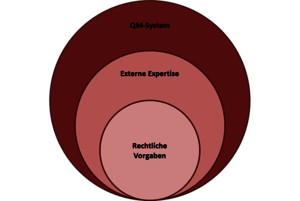- About the university
- Einfache Sprache
- Rector’s office
- Administration
- General Contact Information
- Student Affairs Office
- Library and Media Centre
- Faculty Management & Secretary's Offices
- Orchestra Management
- Event Management
- External Relations, Development and Quality Assurance
- Marketing and Communication
- Human Resources Management
- Accounting/Controlling
- IT Management
- Infrastructure/Facility Management
- Porters
- Quality management
- Sites
- Opening hours
- Vollpension at the MUK
- Cooperations
- MUK.youngstars
- Vacancies
- Press
- International relations
External Quality Assurance
The integration of external expertise is a central element of quality assurance at the MUK. As a private university in the field of art, the opening up to the most important institutions and players in the art and culture business is not only a central concern, but also an integral part of the MUK's self-image. The location of Vienna is a privilege for any art university, which is also a strong focus of the MUK mission statement. The MUK draws on this locally available, internationally recognized expertise in many ways to ensure quality.
The core of external quality assurance is, of course, the legal framework within which the MUK, as a private university, finds itself. The QM system is the framework in which the standardized integration of external expertise is reflected.
Legal requirements
MUK is subject to the legal requirements and regulations of ordinances issued by the Province of Vienna (e.g. the Event Act), federal laws (such as the Private Universities Act) and ordinances issued by the AQ Austria. International regulations such as the European Higher Education Standards and the regulations of the Bologna Process form the external framework.
Integration of external expertise in processes
The structures of the MUK ensure the integration of external expertise into the processes of the private university. University, personnel, artistic and scientific developments are made possible at MUK with the involvement of external experts.
External expertise is incorporated in a variety of ways into studies and teaching (guest speakers, guest lecturers and experts from professional practice, workshops, master classes, course projects).
In preparation for professional practice, auditions and auditions with external jury members are organised. The cooperation with local cultural institutions and organizers within the framework of studies at the MUK serves the same purpose.
The necessary benchmarking with other educational institutions and the requirements of the cultural sector is also carried out through the international exchange opportunities for lecturers and students at the MUK, which are used to a large extent.
Two or three (in the case of appointments to the heads of study programmes) external experts in the relevant fields participate in the selection process for professors and program directors. In addition, two external experts are involved in the appointment process, who examine those candidates who have been invited to a hearing by the appointment committee and who have thus been shortlisted for a professorial position (or a position as head of the programme). In this way, the Rectorate has a further level of quality assurance at its disposal, independent of the appointment committee appointed.
Some of the examinations at MUK are conducted by commissions in which external experts also participate.
In scientific research and artistic research, the scientific community ensures quality assurance by means of peer review procedures. Publications, conference and travel grants, scholarships and, last but not least, third-party funded projects are subject to a strict review system based on excellence criteria.
In order to ensure the quality of internal processes at the Centre for Science and Research at MUK externally, there is an Advisory Board, which is increasingly used for internal review processes and consists of external experts.
External project partners and external experts in scientific and artistic research at MUK are reviewed within the framework of inter-university collaborations such as the Inter-University Research Network Elfriede Jelinek (University of Vienna and MUK) or the research network Beyond the nation, beyond the subject. Rethinking Austrian Modernism (University of Kent UK, co-applicant the MUK)
External consultations and evaluations. MUK also relies on external expertise for counselling its employees. An occupational psychology counsellor is available to MUK employees as a contact person for occupational psychology issues. In addition, regular workshops are offered for MUK employees (e.g. on the topics of stress and coping with it or strengthening resilience).
In accordance with the articles of association, bodies, committees and working groups have the possibility of co-opting external experts on selected topics in order to supplement the competencies available internally with external perspectives.
The same is done on an ongoing basis at the administrative level by involving external consultants in order to be able to make decisions on the basis of a comprehensive assessment by means of additional know-how. In the past, for example, voluntary system accreditations were carried out by the Central Evaluation and Accreditation Agency in Hanover.
A further external consultation takes place through the regular collegial exchange among the seven Austrian music universities, which takes place, among others, in the regular cooperation Take Seven — Long Night of the Austrian Music Universities.
As an association, the Austrian Private Universities Conference (ÖPUK) maintains a regular exchange of experiences and develops suggestions for improvement. The ÖPUK forms subject-specific working groups and supports the fields of activity of the private universities.
The MUK is advised and monitored by auditors, the city and federal audit offices and AQ Austria.
The fulfillment of these tasks follows the quality assurance PDCA cycle.
PLAN Planning measures in compliance with specifications
DO Enable and secure implementation of projects with external expertise
CHECK Review involving internal and external expertise
ACT Improving and adapting measures



